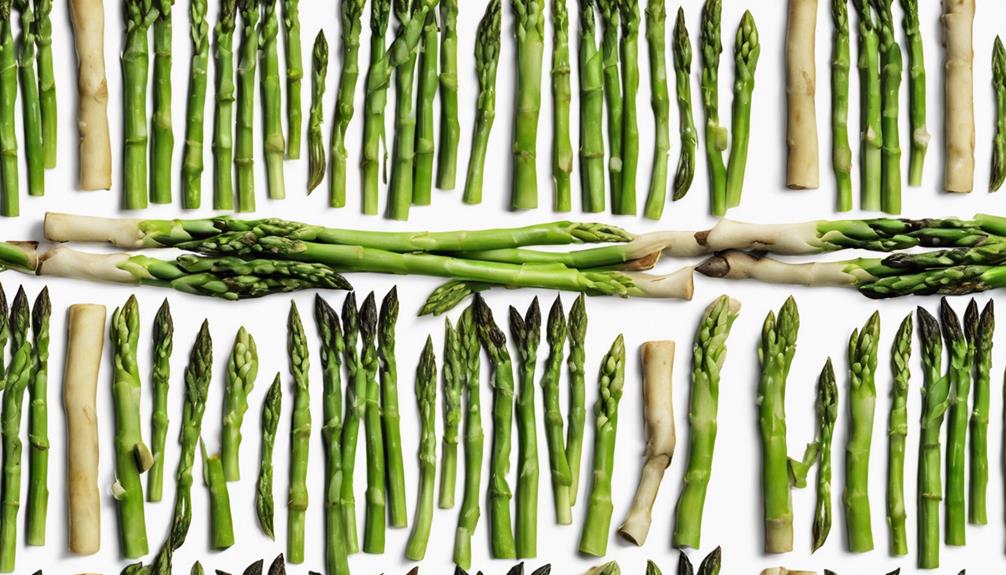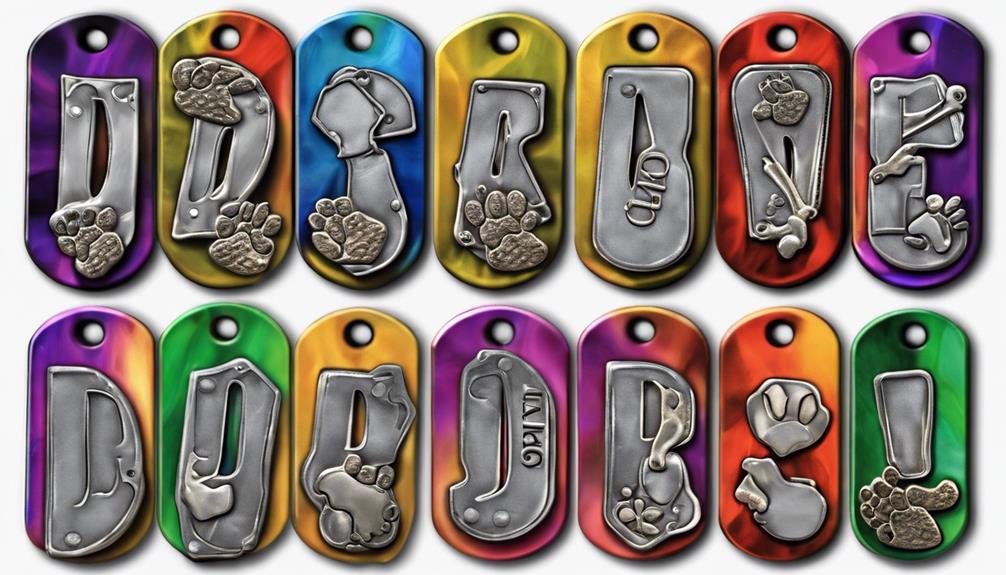Yes, dogs can eat asparagus. It is safe and nutritious, packed with fiber, vitamins A and C, and folic acid. Asparagus promotes overall health, coats, eyesight, and bone strength. Cook it lightly by boiling or steaming without oils or seasonings. Cut into small pieces for easy chewing. Start with small amounts to monitor digestion. Limit to 20% of their diet. Be cautious with raw asparagus to avoid digestive problems. Asparagus is a healthy dog treat option. It's a crucial addition with essential nutrients. Remember, there's more to know about dogs and asparagus' benefits.
Key Takeaways
- Asparagus is safe and nutritious for dogs, rich in fiber and essential vitamins.
- Introduce gradually to monitor digestion and prevent stomach upset.
- Cook lightly to enhance digestibility and avoid choking hazards.
- Limit portion size to 20% of the diet to prevent overconsumption.
- Monitor intake carefully, especially with raw asparagus, to prevent digestive issues.
Asparagus: Safe Addition to Dog Diet
When considering adding asparagus to a dog's diet, it's crucial to note that it's a safe and nutritious choice. Asparagus is safe for dogs to consume and provides essential nutrients such as fiber, vitamins A and C, and folic acid. Whether cooked or raw, dogs can enjoy asparagus, but cooking it can assist in digestion and make it easier for them to chew.
It's recommended to introduce asparagus gradually to monitor how your dog's digestive system responds. Keep in mind, moderation is crucial when offering any new food, including asparagus. Serving small portions of asparagus ensures that it's a healthy addition to your dog's diet without causing any stomach upset.
Remember that approximately 20% of a dog's diet can include vegetables like asparagus. By incorporating asparagus in small amounts and keeping an eye on your dog's reaction, you can safely introduce this nutritious vegetable into their meals.
Nutritional Benefits of Asparagus

Asparagus offers a range of essential vitamins and minerals for our furry friends. These nutrients contribute to overall health, aiding in digestion, cell function, and immune support.
Including asparagus in your dog's diet can help promote coat health, improve eyesight, and strengthen bones and teeth.
Asparagus Nutrients for Dogs
With its high fiber content and rich sources of vitamins A, C, and folic acid, asparagus presents valuable nutritional benefits for dogs. When including asparagus in your dog's diet, bear in mind to:
- Feed in small pieces to prevent choking hazards.
- Confirm your dog can digest asparagus well before increasing the amount.
- Monitor your dog for any signs of digestive upset, like vomiting or diarrhea, when introducing this food.
Introducing vegetables like asparagus gradually can help your dog's digestive system adjust. Approximately 20% of your dog's diet can consist of vegetables, providing essential vitamins and minerals. By incorporating asparagus into your dog's meals, you contribute to a balanced and healthy nutritional intake for your furry companion.
Health Benefits of Asparagus
Introducing asparagus into our dog's diet can lead to various health benefits due to its rich nutritional profile, including vitamins A, C, and folic acid, fiber, potassium, and antioxidants. Asparagus is a great source of nutrients that support our dog's immune system and overall health. Here is a breakdown of the nutritional benefits of feeding asparagus to our furry friends:
| Nutrient | Benefits |
|---|---|
| Vitamins | A, C, and folic acid for overall health |
| Minerals | Potassium, zinc, and iron for strength |
| Fiber | Aids in digestion and gut health |
| Antioxidants | Support immune system |
| Healthy Treat | Low in fat and sugar for a guilt-free snack |
Cooking Asparagus for Dogs

Cooking lightly boiled or steamed asparagus for dogs can enhance its chewability and digestibility. When preparing asparagus for your furry friend, keep it simple to avoid upsetting their stomach. Here are some tips for cooking asparagus for dogs:
- Avoid adding oils, butter, or seasonings: Stick to plain, cooked asparagus to prevent any tummy troubles for your pup.
- Cut into small, manageable pieces: Providing smaller portions of cooked asparagus can reduce the risk of choking and make it easier for your dog to chew.
- Cooking makes it gentler on the stomach: Unlike raw asparagus, cooking helps break down the tough texture, making it safer for your dog to enjoy without the risk of choking or digestive issues.
Introducing Asparagus to Dogs Diet

When integrating asparagus into our dogs' diet, it's important to start with small cooked pieces to observe their reaction. Asparagus can provide dogs with vital nutrients and fiber, but it's critical to introduce it gradually to avoid any digestive issues.
Begin by offering a small amount of cooked asparagus alongside your dog's regular meals. Keep a close eye on how your dog responds to the new addition. If they tolerate it well, you can gradually increase the portion size over time. Remember, asparagus should only make up a small part of your dog's balanced diet.
It's paramount to monitor your furry friend for any signs of stomach upset or adverse reactions, such as vomiting or diarrhea. By introducing asparagus in small pieces and carefully monitoring your dog's response, you can ensure a smooth integration and incorporate this nutritious vegetable into their diet effectively.
Monitoring Asparagus Intake in Dogs

When feeding your furry friends asparagus, it's important to keep an eye on the amount they consume to prevent tummy troubles. Watch out for any signs of stomach upset like gas, vomiting, or diarrhea post-asparagus snack time.
Remember to cut the asparagus into small pieces to avoid any choking hazards and introduce it slowly into their diet to gauge their tolerance and digestion.
Safe Amount for Dogs
To guarantee proper digestion and prevent digestive issues in dogs, monitoring the quantity of asparagus they consume is essential. Here are some tips to make sure your dog's asparagus intake is safe:
- Limit Asparagus Portion Size: Keep the amount of asparagus in your dog's diet to no more than 20% to prevent digestive disturbances.
- Introduce Gradually: Start with small pieces of asparagus to observe any adverse reactions before increasing the amount.
- Monitor Intake: Keep track of the portion sizes and frequency of feeding asparagus to maintain a balanced diet for your furry friend.
Potential Digestive Issues
As dog owners, we must be vigilant in monitoring our furry companions' asparagus intake to prevent potential digestive issues. Raw asparagus can be hard on your dog's stomach, leading to digestive problems like gas, vomiting, or diarrhea. It's crucial to monitor their intake closely to avoid stomach upset.
Offering asparagus in small, manageable pieces can help reduce the risk of choking and aid in digestion. Remember that asparagus can be a choke hazard for dogs, so always supervise them while they're eating. Cooked asparagus is safer and easier for your dog to digest compared to raw asparagus, which can be tough on their digestive system.
Keep your dog healthy by being mindful of their veggie consumption.
Potential Risks of Asparagus for Dogs

Handling the potential risks associated with feeding asparagus to dogs requires careful consideration of their digestive capabilities and the physical characteristics of the vegetable. Here are some important points to keep in mind:
- Choking Hazard: Asparagus can be a choking hazard for dogs due to its tough texture, especially if not cut into bite-sized pieces. It's important to make sure that the pieces are small enough for safe consumption.
- Digestive Upsets: Raw asparagus is harder for dogs to digest compared to cooked asparagus. Feeding raw asparagus may lead to upset stomach, gas, vomiting, or diarrhea in some dogs. Cooking the asparagus can make it easier for dogs to chew and swallow, reducing the risk of digestive issues.
- Avoid Tough Stalk Ends: To prevent choking risks, it's best to avoid feeding dogs the tough bottom end of the asparagus stalk. This part can be particularly challenging for dogs to chew and may pose a higher risk of choking.
Asparagus: A Healthy Dog Treat

Regularly including asparagus in our dogs' diet can provide them with vital nutrients and offer a healthy treat option. Asparagus contains vitamins and minerals like vitamins A and C, which are beneficial for your dog. The high fiber content in asparagus stalks can help with digestion and promote overall gut health.
Additionally, the presence of folic acid in asparagus is advantageous for your dog's well-being. Dogs can consume both cooked and raw asparagus, making it a versatile snack option. When you give your dog asparagus, it's crucial to introduce new foods gradually to monitor any digestive issues.
Around 20% of your dog's diet can consist of vegetables like asparagus, ensuring a balanced and nutritious meal plan. Remember, moderation is key, so feed asparagus in appropriate portions to enjoy its health benefits without overdoing it. Asparagus is beneficial for your dog when served in the right amounts, contributing to their overall health and happiness.
Frequently Asked Questions
Why Can't Dogs Eat Asparagus?
We can't feed dogs asparagus because it's tough to chew and digest. Raw asparagus can lead to choking, especially for dogs.
Even if cooked, asparagus might cause digestive issues like upset stomach, gas, vomiting, or diarrhea in some dogs. The high fiber in asparagus can upset their stomachs.
Cooking it can help dogs chew and swallow it more easily, reducing the choking risk.
How Much Asparagus Can My Dog Have?
We suggest offering your dog asparagus in moderation. Excessive asparagus can disturb their stomach. It's crucial to introduce this treat gradually to avoid digestive problems.
What Vegetables Can Dogs Not Eat?
We should be cautious about the vegetables we feed our dogs, as some can be harmful to them.
Onions, garlic, avocado, tomatoes, cherries, peaches, plums, potatoes, bell peppers, eggplants, mushrooms, raw potatoes, rhubarb, corn on the cob, raw beans, and unripe tomatoes are all vegetables that dogs shouldn't eat due to potential toxicity and digestive issues.
It's important to always research before sharing vegetables with our furry friends.
Why Do Dogs Not Like Asparagus?
Dogs may not like asparagus due to its bitter taste and compounds that can be off-putting to some. Their unique taste preferences, different from humans, can influence their dislike for this vegetable.
The texture and smell of raw or cooked asparagus may also be unappealing to them. It's normal for dogs to have individual food preferences, so if your furry friend doesn't enjoy asparagus, it's perfectly okay to offer them other nutritious options they love.
Conclusion
To sum up, asparagus can be a safe and healthy addition to your dog's diet. Just like how a gardener carefully tends to their plants to guarantee growth and nourishment, you can provide your furry friend with the benefits of this nutritious vegetable.
Remember to introduce it slowly, monitor their intake, and cook it properly to prevent any potential risks. By treating your dog to some delicious asparagus, you're symbolically nurturing their well-being and overall health.










